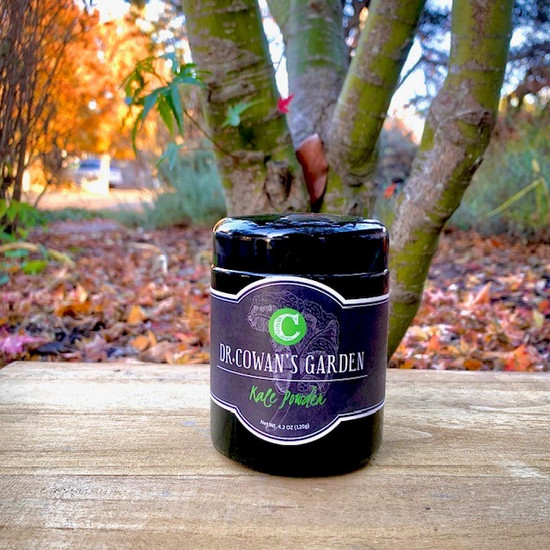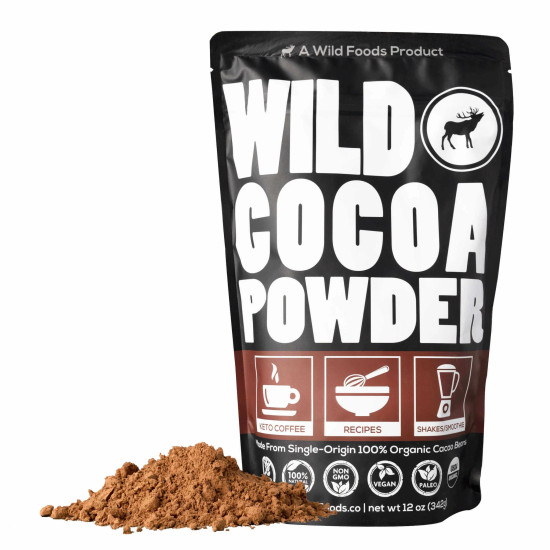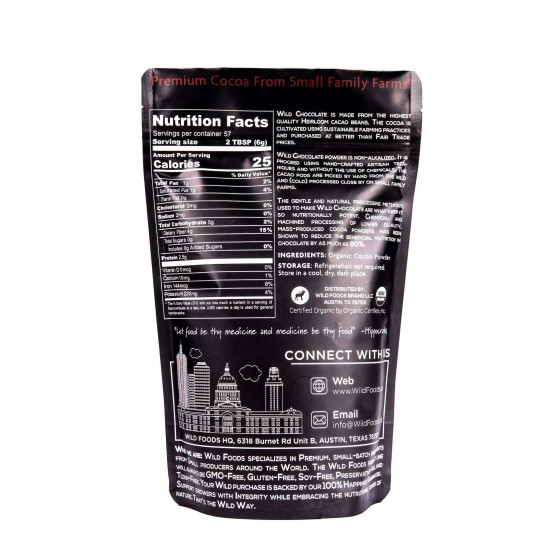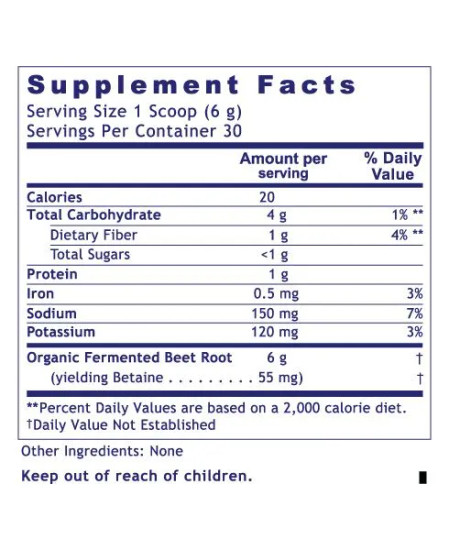Heirloom squash grown just for you.
Dr. Cowan's Garden is a line of nutritionally powerful vegetable powders. The powders nutritional power derives from how they're grown, processed and stored. Dr. Cowan's Garden is on the eastern side of Napa Valley in an area largely protected from the intense heat and hubbub of the rest of the valley; it's fed by well water from the site. The vegetables are grown in hand-dug beds, and no chemical fertilizers have ever been used within the perimeter of the garden. Its location places it within one of the world's most productive growing regions because of its generally warm and dry climate and its cool winds and fog that sweep up the valley from the San Pablo Bay to the south. Some of the vegetables are also sourced from the top organic growers in the Bay Area.
The vegetables are harvested at peak flavor and quality and dehydrated on low heat, almost always within 48 hours of being harvested. The powders are then packed into light-protecting violet glass to preserve flavor and freshness. These beautiful violet glass jars may add to the initial cost of the product (they retail at $20.00 each as you can see on our site here), but Dr. Cowan believes the preservative benefits they provide are immense. Refill packs of the vegetable powders will be available soon so that your jar can be used again and again.
Winter squash is colorful and versatile.
For people who want to reduce or eliminate grains in their diet, winter squash powder can be used in a variety of baked goods, such as cookies and pancakes. Winter squash is an excellent source of carotenoids, a key antioxidant in the human diet; in fact, no single food provides a greater percentage of certain carotenoids than winter squash. Winter squash is also a valuable source of anti-inflammatory omega 3 fats, as well as dietary fiber.
Our heirloom squashes are steamed, then dehydrated to create a nutritious substitute for grains. One of our favorite ways to use Winter Squash Powder is folded into hot, cooked oatmeal with a splash of cream and a drizzle of maple syrup. It also adds sweetness and substance to mushroom risotto, spaghetti sauce and stews. A tablespoon is all you need.
This winter squash powder is as close as possible to a squash you would pick and prepare yourself. A little nutrition is lost, but not much. Mostly, vitamin C is decreased in cooking and dehydration, which can easily be replaced by other foods. According to the USDA, most of the nutrients (like B vitamins) are at least 95 percent levels in dehydrated vegetables. The only exceptions are vitamin C, which is at 60 percent, folic acid at 65 percent and thiamine at 85 percent. Let the taste and smell be your guide. This powder is a very fresh food!
Key Features
- Brimming with antioxidants
- Tasty grain-free flour substitute
- Steamed to maximize flavor and digestibility
- Carefully prepared in small batches
- Harvested at peak flavor
- Dehydrated on low heat within 48 hours of harvesting
- Packed in reusable, light-protecting violet glass
- Free from additives and preservatives
Serving size: 1 tsp
Servings per container: Approximately 50
Ingredients: 100 percent winter squash (mostly butternut). Nothing else.
Frequently Asked Questions
How do you use the powders?
In soups and stews; sprinkled on eggs, roasted vegetables, salads, baked potatoes, popcorn; blended in smoothies; folded into rice, pasta, baked goods or casseroles -- really, added to anything you like to eat. They're great for parents of picky vegetable eaters, people who travel or don't have much time to cook, and creative cooks who want to experiment with different flavor profiles.
What is unique about how the vegetable powders are processed and stored?
The vegetables are harvested at peak flavor and quality and dehydrated on low heat, almost always within 48 hours of being harvested. Low-heat dehydration retains most of the vitamin and mineral content of the vegetables. The greens are blanched before drying to release anti-nutrients, and the beets, pumpkins and winter squash are cooked to maximize flavor and digestibility. Once dried, the vegetables are ground into powders and immediately transferred to Miron violet glass jars.
The unique properties of the Miron violet glass jars don't allow any visible light to pass through; only the invisible parts of light -- UV-A and infrared -- are allowed in. This is significant because the sensitive substances within are protected against the aging processes that are released by visible light, thus enhancing both their potency and durability. Stored in violet glass jars, the vegetable powders will be nutritionally potent for months.
Why not just take a vitamin pill or supplement?
From Dr. Cowan: On the first day of medical school, I heard one of my professors make a statement that has informed my approach to medicine ever since: "Always remember, the dumbest kidney is smarter than the smartest nephrologist." In other words, we have a lot to learn about the human body, and its inherent wisdom is the ultimate teacher.
I apply that same thinking to food: "The dumbest plant is smarter than the smartest chemist." In other words, the nutrients in, for example, kale, work together in a way too complex for us to isolate and put into a pill. If we want the phytonutrients, vitamins and minerals from kale -- and other nutritious vegetables -- we should eat kale that has been grown without chemicals and picked when its color and flavor are at their peak.
Some supplement companies do use whole foods in their supplements, and they can be excellent adjuncts when dealing with a health challenge, but even the most conscientious whole-food supplement manufacturers use such additives as maltodextrin, soy flour, calcium stearate and other stabilizers, which many people seek to avoid. I maintain that our bodies want to be nourished by whole foods, not synthetics, and that means a diet of good fats and proteins and a large variety of vegetables.
To quote the Radiant Life catalog: "Synthetic or isolated forms of vitamins are poorly assimilated and stress cells, often unbalancing the body's enzyme substrates."
How long will the powders last for an average user?
The powders can last years, but we encourage you to use them within three to five months to consume them at their utmost vitality. It's best to check your powders from time to time and perhaps even give them a stir.
Each jar contains approximately 50 teaspoons of powder, and one teaspoon is the equivalent of an average portion of freshly cooked vegetables, such as kale or Swiss chard. Because we recommend using several powders at once to add as much vegetable diversity as possible to your meal, you could easily use just a half-teaspoon each of, say, three powders, which would make each jar last a couple of months at least.
Are the vegetables organic?
They are not only organic (although we are small and at this point there is no practical way for us to get certified), they are also grown in our hand-dug and hand-weeded beds, and the vegetables are picked at optimal ripeness, usually very early in the morning, when they are most potent. As far as we know, no fossil fuels or machinery have been used inside the garden fence for years. How do I know? Because it has been my wife, Lynda, my children, me and various friends and community members who have tended the garden. I have started many of the seedlings myself, I use only non-GMO seeds, mostly from the Baker Creek Heirloom seed catalogue. The "fertilizer" I use are things like organic bone meal, alfalfa, azomite and magnetic rock dust, all certified organic soil amendments. We also source vegetables from the best organic farms in the San Francisco Bay Area.
Are there any additives or preservatives in the powders?
If the label says "kale powder," only dehydrated (at low heat), blanched kale is inside. There is NOTHING else in the jar but vegetables. The only exception is our salts, in which we grind the vegetable powders with fine Celtic sea salt. Nothing else!!!




























